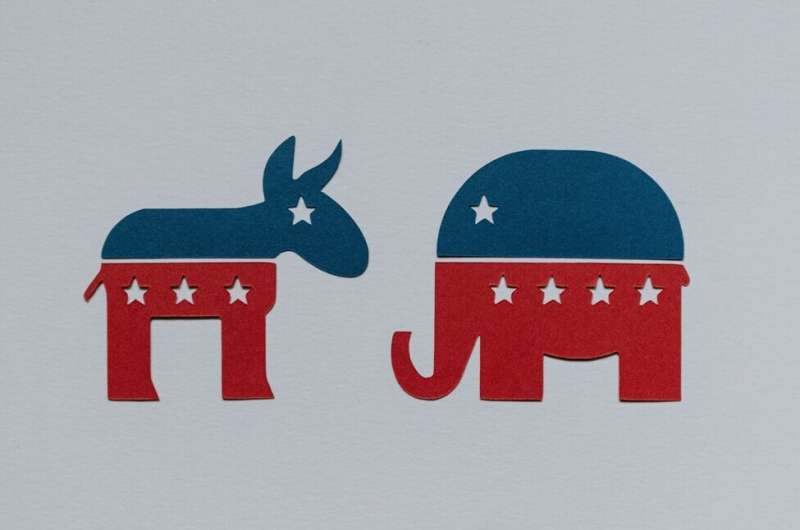This article has been reviewed according to Science X's editorial process and policies. Editors have highlighted the following attributes while ensuring the content's credibility:
fact-checked
peer-reviewed publication
trusted source
proofread
Research finds both conservatives and liberals endorse 'values' and 'vices'

Conservativism and liberalism each represent generally desirable "values" and generally undesirable "vices" in the nation's political landscape, according to newly published research led by a University of Wyoming psychology professor.
The studies conducted by Ben Wilkowski and colleagues from Gettysburg College, the University of Houston and Western Wyoming Community College aimed to take a balanced look at the two political ideologies and their impact on U.S. society.
"When a person indicates that they are 'liberal' or 'conservative,' an important part of what they are communicating is their goals for how they would like society to be structured," the researchers wrote. "Yet, past theories have described these goals in dramatically different ways, proposing that either conservativism or liberalism reflects a divisive or unifying goal, leading to allegations of bias."
In fact, an analysis that included five studies with a total of 1,588 people across the country—including 459 UW undergraduates—revealed that what most people view as positive and negative can be found in both conservativism and liberalism, the study published in the journal Personality and Social Psychology Bulletin concludes.
"There are unifying 'values' and divisive 'vices' related to both ends of the political spectrum," Wilkowski says. "Conservativism simultaneously reflects the unifying value of tradition, as well as the divisive vice of elitism; while liberalism simultaneously reflects the unifying value of inclusiveness and the divisive vice of rebellion."
The researchers reached their conclusions by comparing a broad, representative sample of all possible human goals with political ideology, voting behavior and other expressed characteristics of American adults. In the studies, "vices" are defined as goals that the average person finds undesirable most of the time, and "values" are defined as goals that the average person finds desirable.
When it comes to conservativism, the researchers found that elitism is present in the ideology, reflecting a goal of elevating oneself and one's group to a dominant position. Additionally, the researchers say that another feature of conservativism—tradition—is generally viewed as beneficial in binding together groups of people—for example, by ensuring loyalty to one's group and respecting its authority figures. Nonetheless, traditional values can lead to prejudice against unconventional groups, such as gay men and lesbian women.
When it comes to liberalism, the researchers say inclusiveness values also help bind together people into a community—for example, by ensuring that resources are fairly distributed to different groups. But they also found that rebellion is linked with animosity toward conservatives.
"…[R]ebellion and anti-conservative prejudice are divisive," the researchers wrote. "Rather than building bridges between different groups, they create divisions and drive people apart. They can add to the polarized environment in which hostilities between the left and right flare more brightly."
Wilkowski says the research was intended to provide, from an unbiased perspective, a common framework for considering conservativism and liberalism and their impact on society. He hopes the findings are not twisted or misconstrued.
"We really did go to great lengths to be as objective as possible when conducting the research and writing the paper, and not let study design or the paper write-up be biased by our own political leanings," he says. "We just sought to produce truly informative data and let the data speak for itself."
More information: Benjamin M. Wilkowski et al, Toward a Comprehensive, Data-Driven Model of American Political Goals: Recognizing the "Values" and "Vices" Within Both Liberalism and Conservativism, Personality and Social Psychology Bulletin (2023). DOI: 10.1177/01461672231185484
Journal information: Personality and Social Psychology Bulletin
Provided by University of Wyoming





















